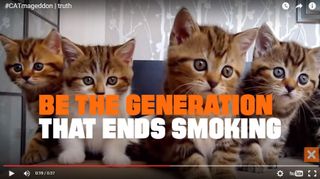#Catmageddon: Why Experts Love New Anti-Smoking Ad

Nothing gets the Internet talking like viral cat videos, and now a new anti-smoking ad has tapped into people's love of funny cats in the name of health education — a move that experts say is a good one.
The ad, which aired during the Grammys this week, features a montage of beloved cat videos, from a feline riding a Roomba, to a kitty fake-playing a keyboard. But along with this cuteness comes an unexpected public health message: Smoking near your pet is hazardous to its health.
"Cats are twice as likely to get cancer if their owner smokes," proclaims a voice in the video, which was produced by a nonprofit organization called the Truth Initiative. "Smoking = no cats = no cat videos," the video warns. The ad encourages viewers to "Be the generation that ends smoking."
The ad generated a buzz on Twitter, with the hashtag "#catmageddon." Tobacco control and public health experts said they were pleased with the video.
"It's very clever," said Andrea Spatarella, a nurse practitioner at Northwell Health's Center for Tobacco Control in Great Neck, New York. Smokers with pets are often surprised to learn that a tobacco habit can affect animals too, she said.
The new video "may bring awareness to somebody that they're not only damaging their own heath, but [also] damaging the health of a pet they love dearly," Spatarella said. [Kick the Habit: 10 Scientific Quit-Smoking Tips]
And it's true that some studies show that cats exposed to secondhand smoke have double the risk of feline lymphoma, Spatarella said. Feline lymphoma is a cancer of a cat's lymph system, and is generally not curable.
Sign up for the Live Science daily newsletter now
Get the world’s most fascinating discoveries delivered straight to your inbox.
Dr. Seema Yasmin, a public health professor and medical analyst for CNN, also tweeted, "This is how you do public health education. Look and learn #CATmageddon"
Although the video might not convince someone to quit right away, it may make smokers more likely to ask their health care providers about quitting, Spatarella said.
"It sparks the conversation, about smoking, about secondhand smoke and possibility about taking steps to quit," she said.
Follow Rachael Rettner @RachaelRettner. Follow Live Science @livescience, Facebook & Google+. Original article on Live Science.

Rachael is a Live Science contributor, and was a former channel editor and senior writer for Live Science between 2010 and 2022. She has a master's degree in journalism from New York University's Science, Health and Environmental Reporting Program. She also holds a B.S. in molecular biology and an M.S. in biology from the University of California, San Diego. Her work has appeared in Scienceline, The Washington Post and Scientific American.
